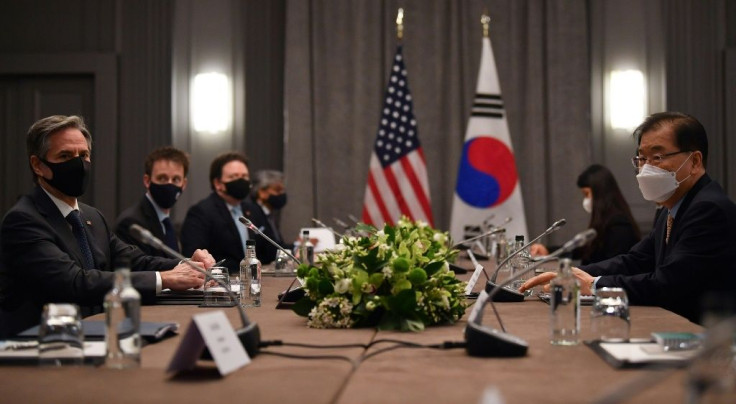Blinken Seeks 'Strong' Latin American Pact On Migration
The United States is seeking a strong declaration to coordinate on rising migration when Latin American leaders meet in Los Angeles in June, US Secretary of State Antony Blinken said Wednesday.
Blinken is paying a two-day trip to Panama to meet regional counterparts as record numbers of people are displaced around the world -- causing not only a humanitarian crisis but growing political worries for President Joe Biden.
Blinken said the Panama talks aim to "lay the groundwork for a strong declaration by our leaders" at the June 6-10 Summit of the Americas in California.
Blinken called for a "Los Angeles Declaration on migration protection that sets forth our shared principles for a collaborative, coordinated response."
"We can make a profound difference in the lives of our most vulnerable fellow citizens and for the future of our region," he said.
Biden called the summit to highlight his agenda of promoting democracy, with autocratic rulers in the region expected to be excluded.
Nearly 100 million people around the world are displaced -- the most since World War II, with Ukrainians fleeing at a startlingly fast pace since Russia's deadly invasion in February.
Migration rates have been increasing for years in the Western Hemisphere, fueled by conflicts, poverty and disasters worsened by climate change.
US authorities in March apprehended more than 221,000 people on the Mexican border, the most for a single month in more than two decades, an issue sure to be highlighted by Biden's Republican rivals in November congressional elections.
But nations throughout the Americas have been coping with rising migration, largely coming from El Salvador, Guatemala, Haiti, Honduras and Venezuela.
Blinken, accompanied by Homeland Security Secretary Alejandro Mayorkas, renewed calls to focus on the root causes of migration, including corruption, political repression and climate change.
And he touched on human rights in El Salvador, whose President Nayib Bukele has launched a crackdown on gangs and violent crime that has seen thousands of people arrested without warrants under a state of emergency.
Gang violence in the country claimed at least 87 lives over a single weekend in March.

"We can tackle violence and crime while also protecting civil rights and fundamental freedoms," said Blinken.
"El Salvador has experienced setbacks in democratic governance, in the separation of powers, the rule of law. And we look to President Bukele to make progress in addressing some of those setbacks," he added.
Blinken also called for coordination to support nations such as Colombia, Mexico, Panama and Costa Rica that are accommodating migrants.
"We know that no country -- no community -- can solve a challenge as complicated as irregular migration alone," he said.
Panama, a close US partner that is home to the dangerous Durian Gap connecting North and South America, on Tuesday signed an agreement to step up coordination with the United States.
Panamanian Foreign Minister Erika Mouynes said the region needed to speak "with a single voice," including at multilateral institutions to secure shared funding.
"We pass this hard test only if we work on it together," she said.
Mayorkas, for his part, said the United States would also seek to resume migration agreements with Cuba that had been discontinued, though he did not specify which ones.
"That is a reflection of our commitment to legal, orderly and humane pathways," he said, "so individuals, including Cubans, do not take, for example, to the seas, which is an extraordinarily perilous journey."
This week, Havana said it would hold its highest-level bilateral talks with the United States since Joe Biden became president -- in Washington on Thursday -- with migration the main topic.
This came after Washington announced last month that it was partially reopening its consulate in Havana, which had been closed since 2017 following alleged "sonic attacks."
US data shows that more than 78,000 Cubans entered the United States via Mexico between October 2021 and last month.
Havana accuses Washington of pressuring Latin American governments to demand transit visas from Cubans arriving at their airports, and of failing to fulfil a commitment to authorize 20,000 immigrant visas a year to Cubans.
After a four-year opening during the presidency of Barack Obama, bilateral relations deteriorated under his successor Donald Trump, who reinforced sanctions in place since 1962.
Despite election promises, Biden has not reversed these measures.
© Copyright AFP 2024. All rights reserved.




















